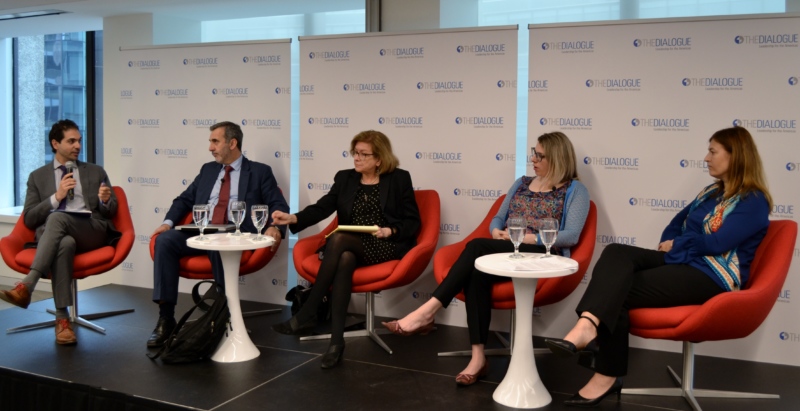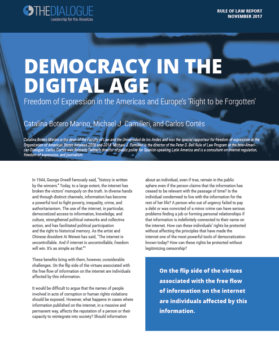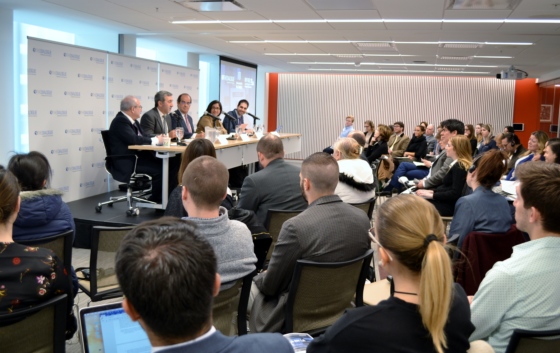
Violence & Impunity: Protecting Journalists in Colombia & Mexico
Violence against journalists is fortunately uncommon in many Latin American countries. But in some parts of the region it is of great concern.
On April 24, the Inter-American Dialogue in partnership with Reports Without Borders (RSF) and the Office of the Special Rapporteur for Freedom of Expression (RFOE) of the Inter-American Commission on Human Rights (IACHR) hosted an event titled “Freedom of Expression in the Americas: Persistent Threats and Emerging Challenges.” This discussion, which was moderated by Michael Camilleri, featured panelists Edison Lanza from IACHR, Margaux Ewen from RSF, Viviana Krsticevic from the Center for Justice and International Law, and Tracy Wilkinson from the Los Angeles Times. The conversation aimed to analyze persistent threats, emerging challenges, and potential solutions for protecting freedom of expression in the Americas.
Lanza drew from the RFOE’s 2017 annual report to highlight the persistent challenges affecting freedom of expression in the region. First, violence against journalists and media outlets has increased. According to the report, twenty-two journalists were killed last year while countless others have faced various forms of threats and intimidation. Second, the increasing political polarization in the region’s democracies has stigmatized the free press. Journalists and media outlets are often labeled as the “opposition” whenever it engages with coverage the government finds unfavorable, like in Ecuador, Nicaragua, or the United States. Governments can intimidate the free press through imprisonment or surveillance. As a result, these factors have partly contributed to self-censorship by the press who worry about their safety. Another challenge is the relationship between digital platforms and access to information. There have been debates, for example, about the implications of regulating “net neutrality” or “fake news.”
“Investigations of crimes must seek broader patterns of violence and harassment in order to unveil and dismount networks of silencing.” @mundopenelope #FOEAmericas @The_Dialogue pic.twitter.com/OXnWywJgyV
— CEJIL (@cejil) April 24, 2018
Wilkinson, a reporter who previously worked in Latin America, recounted what has changed in the decades since she first traveled to Mexico. The country is no longer safe for foreign journalists and has worsened for domestic journalists. According to Wilkinson, residents no longer feel comfortable talking with foreign journalists, fearing that they are jeopardizing their safety. She was also no longer able to stay for an extended period of time in parts of Mexico because of persistent threats. Foreign journalists can adjust to these changes through quick visits and source anonymity but domestic journalists are forced into self-censorship since they do not have protection or support from the government.
Krsticevic drew comparisons between attacks against the free press and human rights advocates. She noted how the latter have always been vulnerable to the state through intimidation and coercion. High rates of impunity have created an enabling environment for criminals. They know that their actions against these groups will not be prosecuted.
Ewen highlighted cases where the United States and Canada are not innocent from these issues either. For example, there have been arrests of journalists who cover protests, such as those for the North Dakota Pipeline or Black Lives Matter. While violence against journalists has been low compared to other countries, intimidation and surveillance are common. Ewen further argued that while the Obama administration had a tense relationship with the press, it was not outright dismissive like Trump is today. This administration has emboldened authoritarian leaders abroad who have adopted his rhetoric, knowing that they may not receive a strong rebuke from the administration. In a way, Ewen asserted that the US is no longer leading by example.
On the other hand, the panelists noted the progress in the judiciary’s role in addressing impunity against attacking journalists, protecting freedom of expression, and ensuring open access to information. Some countries in the region have also begun the process of drafting legislation that would penalize crimes against journalists or regulate government spending on public advertising and media outlets. These two areas demonstrate a real opportunity to further strengthen protections. Despite the current rhetoric, the US still has a strong capacity to exert pressure on governments abroad.
Violence against journalists is fortunately uncommon in many Latin American countries. But in some parts of the region it is of great concern.
A report on freedom of expression in the Americas and Europe’s ‘right to be forgotten’.
On November 15, the Inter-American Dialogue hosted the event “Corruption, Internet Freedom, and Online Privacy in Latin America,” bringing together panelists to discuss a report recently published by the Inter-American Dialogue about freedom of expression and the concept of the “Right to be Forgotten.” The event’s panelists included Catalina Botero, Edison Lanza, José Luis Piñar, Romina Mella, and Michael Camilleri. The panel explored the concept of the “Right to be Forgotten” in the context of Latin America, considering the tension between privacy and transparency, and how European privacy standards can be adapted for the Americas.
 Irene Estefanía González / Inter-American Dialogue
Irene Estefanía González / Inter-American Dialogue

 Video
Video